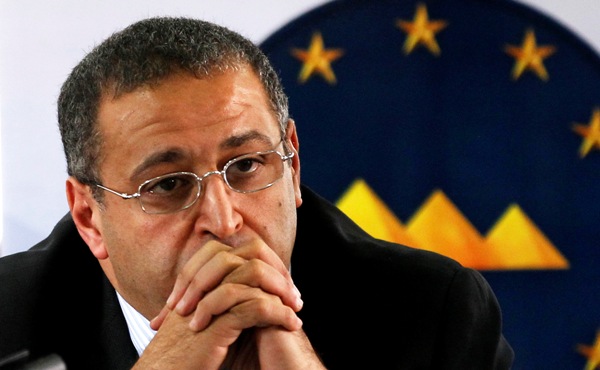Latest NEWS
- Aswat Masriya, the last word
- Roundup of Egypt's press headlines on March 15, 2017
- Roundup of Egypt's press headlines on March 14, 2017
- Former Egyptian President Hosni Mubarak to be released: lawyer
- Roundup of Egypt's press headlines on March 13, 2017
- Egypt's capital set to grow by half a million in 2017
- Egypt's wheat reserves to double with start of harvest -supply min
- Roundup of Egypt's press headlines on March 12, 2017
Egypt sees Suez Canal zone making up 30-35 pct of economy: minister

Egypt Investment Minister Ashraf Salman looks on during a news conference in Cairo October 30, 2014. Picture taken October 30, 2014. REUTERS/Mohamed Abd El Ghany
By Shadi Bushra and Ehab Farouk
CAIRO (Reuters) - Egypt expects a planned economic zone near the Suez Canal to eventually make up about a third of Egypt's economy, the country's investment minister said on Thursday.
Egypt plans to build an international industrial and logistics hub near the canal to attract foreign investment, alongside a separate scheme in which the army is digging a second canal to facilitate two-way traffic of larger ships.
Investment Minister Ashraf Salman said the planned hub would be the centrepiece of a key economic conference planned for the end of next week, which Egypt hopes will draw investors back after four years of economic and political turmoil.
"The main project that we'll show in the conference is the development of the Suez Canal, which will represent 30-35 percent of Egypt's new economy," Salman said during a news conference Thursday.
He did not say when the economic zone would reach that share of the economy.
The 145-year-old waterway is the fastest shipping route between Europe and Asia. It is one ofEgypt's main sources of hard currency, bringing in about $3 billion a year. Egypt's GDP was $232.86 billion in 2014, according to Thomson Reuters data.
The $8 billion army-led expansion of the canal is expected to increase canal revenues to $13 billion by 2023 from the current level of about $5 bashillion, the canal's chairman told Reuters last week.
In a bid to boost the planned economic zone's attractiveness to investors, Egypt cut corporate taxes in the zone to a third of the national rate last month.
Salman also said Thursday that foreign direct investment is expected to reach $15 billion by the 2018-19 fiscal year. It is expected to reach $8 billion in the current fiscal year, which ends in June, and reach $10 billion the following year.
Egypt's cabinet yesterday approved a long-awaited draft law on investment that aims to make deals less vulnerable to legal disputes or changes in government, while reducing bureaucracy.










